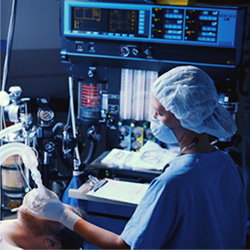| Whatever your unique preferences, HealthCare Traveler-Jobs has the resources and connections to the top staffing agencies to place you into the opportunity that works best for you. You’ll be able to choose from hundreds of CRNA jobs across the U.S. in a variety of settings, including OutPatient Surgery Centers, Hospitals and more. |
| APPLY todayand premier staffing agencies come to YOU! |
| Certified Registered Nurse Anesthetists at a Glance |
Nurse anesthetists have been providing anesthesia care to patients in the United States for nearly 150 years.
The credential CRNA (Certified Registered Nurse Anesthetist) came into existence in 1956. CRNAs are anesthesia professionals who safely administer approximately 32 million anesthetics to patients each year in the United States, according to the American Association of Nurse Anesthetists (AANA) 2009 Practice Profile Survey. 

CRNAs are the primary providers of anesthesia care in rural America, enabling healthcare facilities in these medically underserved areas to offer obstetrical, surgical, and trauma stabilization services. In some states, CRNAs are the sole providers in nearly 100% of the rural hospitals.
According to a 1999 report from the Institute of Medicine, anesthesia care is nearly 50 times safer than it was in the early 1980s. Numerous outcomes studies have demonstrated that there is no difference in the quality of care provided by CRNAs and their physician counterparts.
CRNAs provide anesthesia in collaboration with surgeons, anesthesiologists, dentists, podiatrists, and other qualified healthcare professionals. When anesthesia is administered by a nurse anesthetist, it is recognized as the practice of nursing; when administered by an anesthesiologist, it is recognized as the practice of medicine. Regardless of whether their educational background is in nursing or medicine, all anesthesia professionals give anesthesia the same way.
As advanced practice registered nurses, CRNAs practice with a high degree of autonomy and professional respect. They carry a heavy load of responsibility and are compensated accordingly.
CRNAs practice in every setting in which anesthesia is delivered: traditional hospital surgical suites and obstetrical delivery rooms; critical access hospitals; ambulatory surgical centers; the offices of dentists, podiatrists, ophthalmologists, plastic surgeons, and pain management specialists; and U.S. military, Public Health Services, and Department of Veterans Affairs healthcare facilities.
Nurse anesthetists have been the main providers of anesthesia care to U.S. military personnel on the front lines since WWI, including current conflicts in the Middle East. Nurses first provided anesthesia to wounded soldiers during the Civil War.
Managed care plans recognize CRNAs for providing high-quality anesthesia care with reduced expense to patients and insurance companies. The cost-efficiency of CRNAs helps control escalating healthcare costs.
In 2001, the Centers for Medicare & Medicaid Services (CMS) changed the federal physician supervision rule for nurse anesthetists to allow state governors to opt out of this facility reimbursement requirement (which applies to hospitals and ambulatory surgical centers) by meeting three criteria: 1) consult the state boards of medicine and nursing about issues related to access to and the quality of anesthesia services in the state, 2) determine that opting out is consistent with state law, and 3) determine that opting out is in the best interests of the state’s citizens. To date, 15 states have opted out of the federal supervision requirement, most recently California (July 2009). Additional states do not have supervision requirements in state law and are eligible to opt out should the governors elect to do so.
Nationally, the average 2009 malpractice premium for self-employed CRNAs was 33% lower than in 1988 (62% lower when adjusted for inflation).
Legislation passed by Congress in 1986 made nurse anesthetists the first nursing specialty to be accorded direct reimbursement rights under the Medicare program.
More than 40,000 of the nation’s 44,000 nurse anesthetists (including CRNAs and student nurse anesthetists) are members of the AANA (or, greater than 90%). Approximately 41% of nurse anesthetists are men, compared with less than 10% of nursing as a whole.



